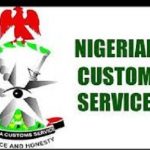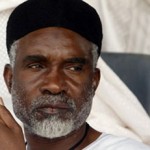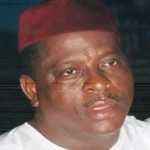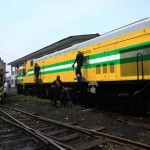Wither Ideology From Nigerian Politics?
Agabus Pwanagba, Articles/Opinion, Latest Headlines Wednesday, May 27th, 2015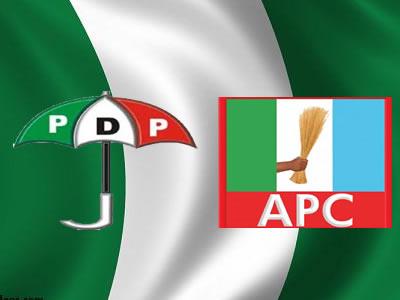
By Agabus Pwanagba, Jos -The democratic history of Nigeria cannot be found less interesting when placed side by side to those of the proponent nations of Britain, USA, France, etc except for its peculiarity in terms of deficiency in ideological leanings which under ideal situation ought to be one among major determinants of identity and identification.
A macroscopic look into democratic experience prior, during and post colonial era in the Nigeria nation state says volume about stakes that have been raised to constitute unit of identity and rallying point; ethnicity, regionalism, and in most dominant manner money politics which have over rode all other forms of definers.
In the first republic for instance, there was glaring prospect of building ideological towers in line with the Pan African spirit which was actually the driving force behind the agitations for political independence from the British authority symbolized by the large present of British technocrats and the Union Jack, but before long, regional sentiment infiltrated the terrain and we had the formation of political parties and followership mostly in line with the regional interests, with National Council for Nigeria and Cameroon (NCNC) holding preponderance in mostly Southern region and not the North.
With the almost seamless progression into the second republic, we saw more regionalized political parties with the AG (Action Group) heavily in the South-west, Northern People Congress (NPC) in the North, etc and this later became doctrine of the Nigerian body parties up to the current dispensation, where political parties being tropicalised.
The Ideological frameworks which ought to collapse these primordial fences have long been in limbo or better still non existent.
Unarguably, the controversial zoning formula for rotational Presidency is an exclusive product of the regional consciousness that overrides Nigerianity. In essence it is the continuation of the
regional rivalry that held sway during regional governments under Premiers. This was the cankerworm that some military administrations especially those under Gen. Yakubu Gowon and Murtala Mohammed tried to abolish with creation of states to replace regional authorities, that formally had Sir Ahmadu Bello overseeing the North, Chief Obafemi Awolowo for the West and Chief Michael Okpara for the East.
With the return of democratic structures in 1999, the stage was set again with the adoption of the zoning arrangement in some political parties especially for the seat of the President which many said was ceded to the South-West for compensatory reason, but before the so
called “gentle man arrangement” started, it had failed and woefullybtoo especially with the interference of certain interests. As a result, after 16 years, we are still wobbling in an issue that is a construct of a few.
A Nigeria State devoid of ideological framework with national outlook as it were has a fertile is responsible for the ills of corruption bedeviling the nation as ethnicity is dragged in to scuttle culpability.
The issue of zoning of political offices in the country is unarguably the glaring symptom of the dearth of ideology, where region of origin has been prioritized rather than programmes of governance, where the faith of an office seeker is of paramount importance rather than the merits inherent in him.
A Nigeria built on ideological consideration possesses propensity of collapsing primordial consideration of faith, regionalism and ethnicity. It has the tendency of bringing the together people of different regions in unison based on the views on issues they share and the commonality of ills they seek to address. Political parties built on Ideology grounds could be that penancea that has eluded the Nigerian nationhood for decades.
For instance, the late progressive scholar, Dr. Bala Usman postulated that the Northern Element Progressive Union (NEPU) headed by the then sage Alhaji Aminu Kano enjoyed national appeal even though it failed to capture some Southern States because of its welfarist Ideology built on the talakawa (proletariat) cliché, the strength of that Ideology is located on the careful analysis of the economic fate of over 60% of Nigerians who at the time were below the U.N poverty benchmark of $1 per day. His party got wide acceptance because it was built on masses – friendly postulations which in this case was devoid of regional considerations because all regions and creeds have the proletariat class.
We have witnessed unending defections from one political party to another by political office holders and appointees mostly from parties that provide prominence to the one in power without recourse to certain fundamentals that include vacating seats occupied. On most
orall occasions, such cross – carpeting are excused for internal wrangling in the party thereby weakening opposition and all its pluses.
These actions many pundits describe, is a negation to the principle of honour that encourages honourable people to identify with a course they truly believe in and work assiduously to promote it at all meaningful course rather than boycotting it at the middle of nowhere.
In Nigeria, State Governors, Senators and Representatives in the National Assemblies, Local Government Chairmen and even Councillors have gone into all sorts of permutations mostly with parties in power to fetch them a defection against the Ideology they once believed in for which the electorate also voted them. And because of the mad rush for the pasture and spoils of belonging to the party in power, the beauty of opposition has been slaughtered on the altar of greed and the result is the gradual drift towards one party state which is undoubtedly absurd for our kind of clime.
Since the APC clinched the presidential election conducted on March, 28th, 2015, the calibre of people defecting from the People’s Democratic Party, PDP, to the All Progressives Congress, APC, shows clearly that PDP is in dire striate, indeed. Why have the defectors suddenly found the PDP unworthy of their membership?
The APC have witnessed the decampment of PDP chieftains; former top party bigwigs elected on the platform of thePDP, including deputy governors; former ministers; Senators; members of the House of Representatives, and many more power brokers defecting publicly from the PDP to the APC. If they were truly disenchanted with the PDP why didn’t they summon the courage to leave the party before the March 28, presidential election and the April 11, 2015, governorship election?
The lessons from the spate of defection, is that politics in Nigeria is currently being regarded as an industry considering the prevailing harsh economic realities bedeviling the nation. What contributions can those who have benefited from being members of the PDP through the attainment of elective positions and the concomitant financial appurtenances make to the APC, now that the APC has won?
President elect, Muhammadu Buhari, had asked, what contributions are those who have defected from the PDP to the APC after the PDP lost the presidential election, and those who are currently in talks with the APC leadership with the sole aim of decamping really want to add to an APC-led federal government that they could not contribute to the out-going PDP-led federal government in the 16 years that the PDP ran the federal government?
A cursory look at the workings of democracies in advanced nations will reveal that party memberships are caused by clear-cut manifestoes, built out of an Ideology, for instance, the United States of America’s two contenting political parties does not enjoy blind followership;
the Democrats and Republicans have succeeded to carve manifestoes in line with the inherent peculiarities of the American society as a result, campaigns for votes are issue-based rather than propaganda, campaigns are designed along the basic issues of pressing rather than aspirant’s region of origin.
The Presidential election that midwifed President Barrak Obama, pressing national issues like policy on healthcare, economy, taxes, remunerations and the war in Iraq and Afghanistan where billions of American dollars are spent formed the crux of the debate where the sitting President, Mr. Obama and a war veteran John McCain slugged it out, while Americans listened and drew out their preference along the Ideological input inherent on the various positions postulated.
In the United Kingdom, the Labour Party which had held power for over a decade lost to the conservative, when David Cameron emerged against the then incumbent Gordon Brown. The paradigm shift was largely informed by loss of Ideological adherence occasioned by Mr. Brown’s inability to live up to the expectations of the average Briton. In the two scenarios, primordial standards were subsumed by concrete issues of policies and practicability of frameworks so postulated.
In Nigeria, no political party have been able to carry people along its Ideological base, party manifestoes are hardly known by aspirants contesting under such platforms, rhetorics and pledges have been the items of campaign, with salt for cooking in households and wrappers for women to wear as the tool of campaign.
In other instances, maggi, and other food seasonings have been purchased by political demagogues, desperate for power for eventual distribution for the poverty stricken Nigerians whose votes in other cases are snatched away in the ballot boxes by hired thugs or are rendered futile by electoral officers who for their compromising roles smile to the banks because of inducements.
In other cases, personalities with threatening political antecedents and credentials are gunned down at the eve of elections to deny electorate of its flair for choice, Chief Harry Marshal, Engr. Funsho Williams, and a host of others are bitter testimonies.
Regrettable, Nigeria have found itself a fief for a score of pedigreed individuals who despite their warped grasp of the ideal status quo of things, still have the supreme say in every, if not all political business, such individuals and other geo political entities now see themselves as primus inter pares, they build blocs which are meant for them to be cohesive and indispensible, perhaps these were the misnomer that caused the U.S President, Barrak Obama to postulate that Nigeria does not need strong men, rather strong institutions. These institutions ought to be built on core social values which are enshrined in the Constitution to which all within the Nigeria state have agreed to reign supreme.
It’s appalling that the conduct of political, economic and social activities is rudely devoid of ethical and moral principles, a condition that will continuously hamper the process of national
integration. The National Anthem are not played or sung at many public functions, even when played, many people are seen to be seated, without bothering to give that mark of honour to the country.
There is wide spread apathy to the performance of civic responsibilities with quiet a chunk of the population refusing to be counted during nation-wide census and in other cases chasing away census enumerators, non-participation in the voter’s registration exercise etc. economically, there is the aberration incessant destruction of public utilities like oil pipelines, electricity and telecommunication installations. Also injurious to the nationhood and due to non-existent political Ideology, now have derogatory stereotypes. These artificial constructs have political relevance for the genre of political desperation in Nigeria where politicians see the Unity of the people as a great threat for their relevance.
However, at the peak of the electioneering campaigns, the incoming APC administration had anchored its presidential election on combating corruption, poverty, insecurity and unemployment. Will they fulfill their promises? Only time will tell.
Therefore a nation without political Ideologies drawn from the desirable core values of the people is rather a disaster.
Agabus Pwanagba Writes From Jos
Related Posts
Short URL: https://www.africanexaminer.com/?p=23741


